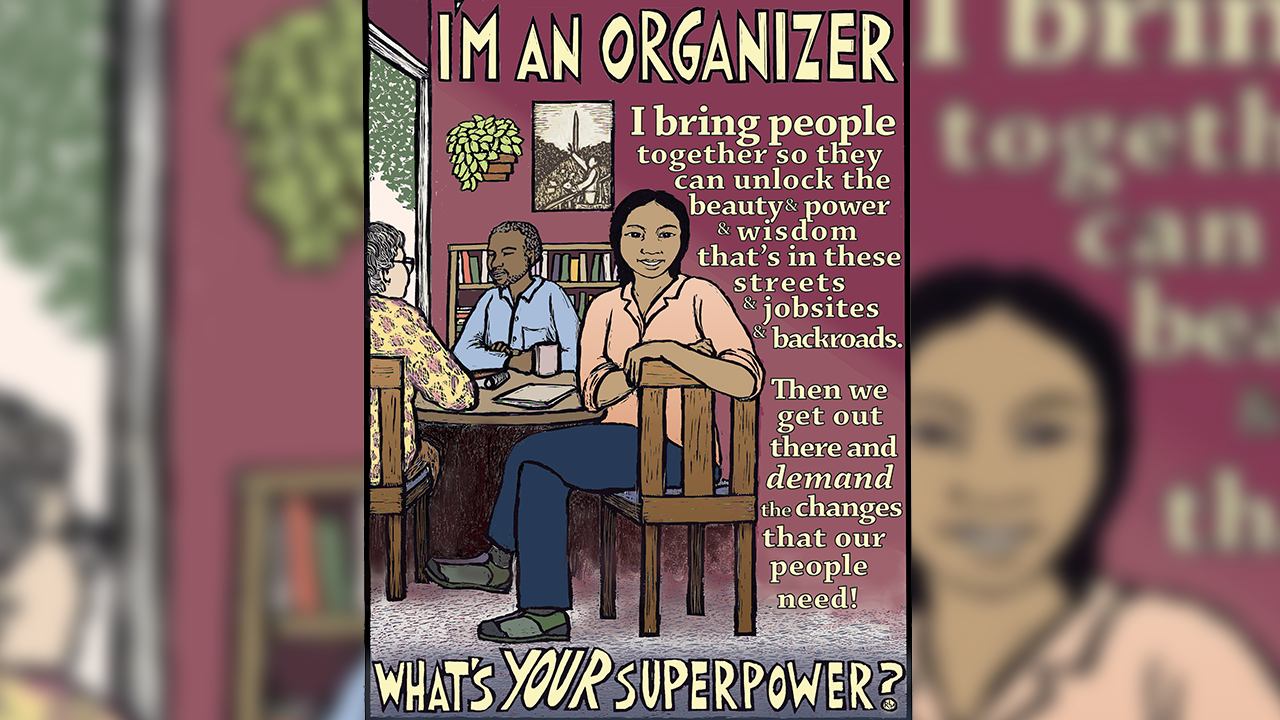Organizers are storytellers. One of the first things many of us learn when we’re starting out in the movement is to tell our own stories about what brings us to the work. As we canvass neighborhoods, build committees, and lead campaigns, we ask others to share their stories as a way of forging community, solidarity, and a shared analysis of the political roots of individual problems. Narrative is not a communications strategy to be layered on top of organizing campaigns but fundamental to the work we do as organizers: expanding people’s sense of possibility, agency, and power to create change.
We don’t have to look much further than our current moment to understand the power of narrative to transform what is possible. As people across the country have taken to the streets to demand that local governments defund the police, we’ve seen a rapid change in the public narrative around the role of policing in our society — and the possibility to create new systems for building safe and just communities. To emphasize the importance of narrative change in our current moment, all of the artwork for this issue was created by Ricardo Levins Morales, a movement artist who has been instrumental in helping to change the narrative about policing in Minneapolis through his work with MPD150.
This issue invites us to think about how to scale the narrative work we do as organizers so that we can not only win individual campaigns but transform the structures of power that maintain racism, inequality, and ecological extraction. Our guest editors, Jonathan Heller and Judith Barish, sat down with thirteen organizers from across the movement to discuss their work building long-term strategies and integrating narrative change into organizing drives.
Here are a few excerpts from their conversations:
-
-
Anat Shenker-Osorio shares her insights on using narrative strategy to build winning campaigns: “We can bring to the fore better narratives that exist within people but are suppressed. That can change their actions, and that can help us win.”
-
-
-
Anthony Thigpenn reflects on the changes in community organizing as he tells us about his campaign to defeat California’s Proposition 13: “We need to reach millions of people, and we’re not going to do that with one-on-one visits and phone calls. We need to move millions toward a more progressive set of values and ideology.”
-
-
-
Andrea Dehlendorf discusses her work building campaigns with low-wage workers to challenge corporate narratives. She argues that we have “a window for a big intervention. The question is whether the labor movement and working people who are self-organizing will be audacious enough and make big enough demands to shift this fundamentally.”
-
-
-
Annie Leonard challenges us to build more hopeful narratives to fight climate change: “On one hand, the climate crisis is a terrifying and deadly threat. On the other hand, it is a massive opportunity to set things right. It’s important we frame it that way: responding to the climate crisis builds a healthier economy and healthier people.”
-
-
-
Doran Schrantz speaks about narrative strategy as something organizers do rather than say: “The North Star of our organizing is our ability to offer people a sense of their own power and agency and develop our collective capacity to build a path to power together. This mission infuses everything we do.”
-
-
-
Dorian Warren talks about the possibilities in this moment to build a more progressive future: “As we rebuild our democracy and our economy, maybe this is a chance to put some nails in the coffin of neoliberalism. This is going to be the decade of Reconstruction if we can organize well.”
-
-
-
Evan Wolfson reflects on why he fought for decades to win same-sex marriage and how the campaign transformed the narrative about gay men and women: “I believed the Freedom to Marry campaign wouldn’t win everything, but it would change everything.”
-
-
-
Ishita Srivastava & Kristina Apgar argue that we must shift cultural norms around caregiving as visible and valuable labor: “We are responsible for each other and responsible for our collective health, education, care, and well-being.”
-
-
-
Miya Yoshitani talks about the narrative campaigns we need to win environmental justice: “You have to paint a concrete, tangible picture of the regenerative economy because we need a mass movement of millions of people. We’re currently limited in our imagination because we’ve been living in the extractive economy for our whole lives and for so many centuries.”
-
-
-
María Alegría Rodriguez tells us about her work changing narratives around immigration and the 1,500-mile Trail of Dreams walk that “captured the imagination of the public and revealed the contradictions of those young people in what they called ‘golden cages’ of second-class citizenship.”
-
-
-
Richard Kirsch discusses the campaign to win the Affordable Care Act and the organizing work to change Americans’ narratives about healthcare: “The organizing and the narrative were always one.”
-
-
-
Tara Raghuveer talks about transforming our understanding of housing, from a private commodity to a public good, and how grassroots leaders set the radical vision of the Homes Guarantee: “Every single time we meet with our grassroots team of tenants, they make our demands more radical. Every single time…. It’s because they know what they’re owed. Once people begin the process of transforming personal pain and trauma into public power, they become very clear on what has been taken from them, by whom, and what they are owed.”
-
-
-
Zach Norris talks about his work changing the narratives about incarceration and policing: “Safe neighborhoods aren’t safe because there’s a ton of police: they’re safe because people have good jobs and access to opportunity and believe they have a future ahead of them.”
-
Finally, Richard Healey and Sandra Hinson, who have been influential in shaping community organizing, analyze how the field has changed over the last three decades, with organizers today more game for waging ideological and long-term campaigns. Now, they argue, we need to go beyond narrative and begin to “do” ideology.
We hope this issue will provide fodder for more conversations about how we can craft the bold and strategic campaigns we need to build a just, equitable, and secure future for everyone.

